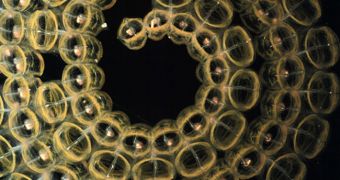The streamlined jellyfish-like creature known as the salp is one of the most efficient organisms on the face of the planet. The small, barrel-shaped animal lives inside the world's oceans, were it's able to make good use of the water around it to both eat and propel itself. Researchers say that they envision a future in which cars, for example, will be able to do the same thing, as get their fuel from the air they pass through. Their exhaust fumes would in fact be chemicals beneficial to the environment, and all of this could become possible if experts take inspiration from nature.
In the case of the salp, marine biologists believe that it eliminates excretion products that may in fact be contributing to attacking carbon dioxide the water absorbs from the atmosphere. The natural compound traps and removes the CO2 from the upper layers of the oceans, allowing for the waters to draw even more of the greenhouse gas, keeping the atmosphere nice and tidy. According to a new scientific research, it would appear that the small creatures are even more efficient than thought. The research was conducted by experts at the Woods Hole Oceanographic Institution (WHOI), in collaboration with experts from the Massachusetts Institute of Technology (MIT).
“This innovative research is providing an understanding of how a key organism in marine food webs affects important biogeochemical processes,” explains the director of the US National Science Foundation (NSF)'s Biological Oceanography Program, David Garrison. The BOP provided the WHOI/MIT collaboration with parts of the funds needed to conduct the new investigation. Details of the research appear in this week's issue of the esteemed journal Proceedings of the National Academy of Sciences (PNAS).
“We had long thought that salps were about the most efficient filter-feeders in the ocean. But these results extend their impact down to the smallest available size fraction, showing they consume particles spanning four orders of magnitude in size. This is like eating everything from a mouse to a horse,” explains WHOI Director of Research Larry Madin, who was also one of the authors of the PNAS paper. He adds that the salp apparently can also survive on very small particles floating in the ocean. “Their ability to filter the smallest particles may allow them to survive where other grazers can't,” he says.

 14 DAY TRIAL //
14 DAY TRIAL //